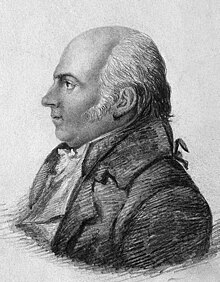Thomas Beddoes
| Thomas Beddoes | |
|---|---|

Thomas Beddoes, pencil drawing by Edward Bird
|
|
| Born |
13 April 1760 Shifnal |
| Died | 24 December 1808 (aged 48) |
| Nationality | British |
| Education | Bridgnorth Grammar School |
| Alma mater | Pembroke College, Oxford, University of Edinburgh |
| Occupation | Physician |
| Known for | History of Isaac Jenkins |
| Spouse(s) | Anna Maria Edgeworth 1773–1824 |
| Children | Thomas Lovell Beddoes |
Thomas Beddoes (13 April 1760 – 24 December 1808) was an English physician and scientific writer. He was born in Shifnal, Shropshire. He was a reforming practitioner and teacher of medicine, and an associate of leading scientific figures. He worked to treat tuberculosis.
Beddoes was a friend of Samuel Taylor Coleridge, and, according to E. S. Shaffer, an important influence on Coleridge's early thinking, introducing him to the higher criticism. The poet Thomas Lovell Beddoes was his son. A painting of him by Samson Towgood Roch is in the National Portrait Gallery, London.
Beddoes was born in Shifnal on 13 April 1760 at Balcony House. He was educated at Bridgnorth Grammar School and Pembroke College, Oxford. He enrolled in the University of Edinburgh's medical course in the early 1780s. There he was taught chemistry by Joseph Black and natural history by Kendall Walker. He also studied medicine in London under John Sheldon (1752–1808). In 1784 he published a translation of Lazzaro Spallanzani's Dissertations on Natural History, and in 1785 produced a translation, with original notes, of Torbern Olof Bergman's Essays on Elective Attractions.
He took his degree of doctor of medicine at Pembroke College, Oxford University in 1786.
In 1794, he married Anna, daughter of his associate at the Bristol Pneumatic Institution, Richard Lovell Edgeworth. Their son, poet Thomas Lovell Beddoes, was born in 1803 in Bristol.
Beddoes visited Paris after 1786, where he became acquainted with Lavoisier. Beddoes was appointed professor of chemistry at Oxford University in 1788. His lectures attracted large and appreciative audiences; but his sympathy with the French Revolution excited a clamour against him, he resigned his readership in 1792. In the following year he published the History of Isaac Jenkins, a story which powerfully exhibits the evils of drunkenness, and of which 40,000 copies are reported to have been sold.
...
Wikipedia
